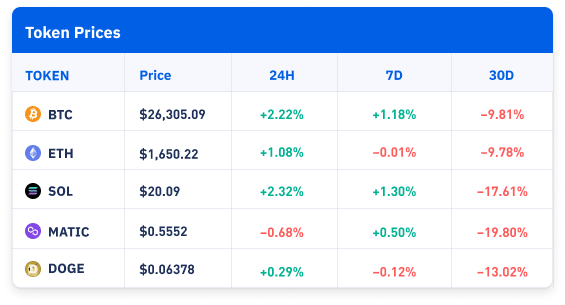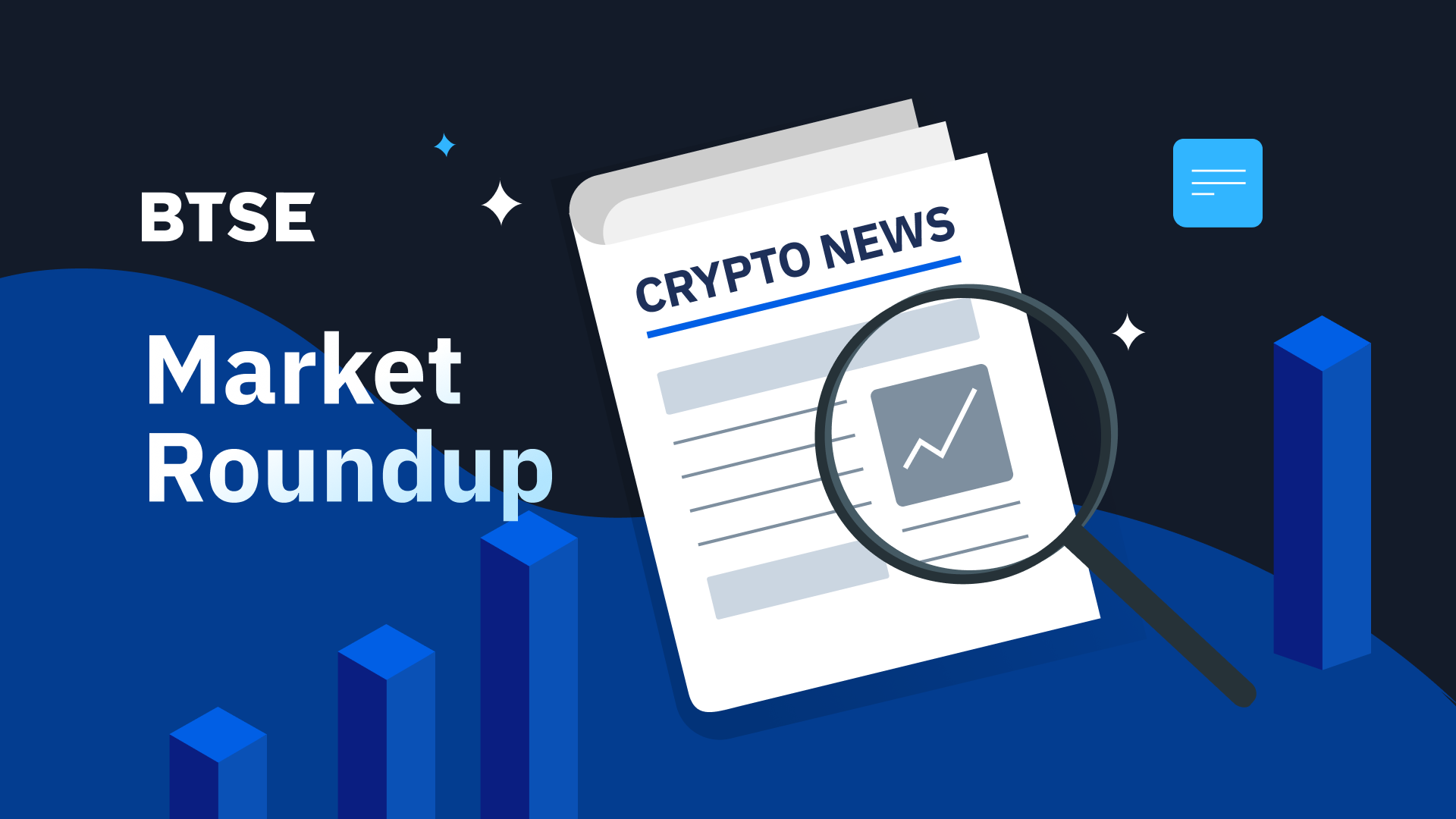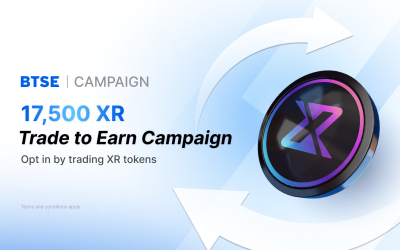Welcome to the latest edition of our Market Roundup, where we cover the highlights of the past week in the rapidly evolving world of blockchain and decentralized technologies.
Major cryptocurrencies traded sideways for the past seven days, but it was a week packed with important developments.

(as of 9:30 AM Singapore Time, September 1, 2023)
Visa linked up with Solana for a pilot program to enable USDC payments for merchants. The significance of this can’t be overstated: traditional finance and blockchain infrastructure are becoming increasingly intertwined. SOL moved up by 5% on the news, then receded back to roughly its original level after traders took profits.
Then, MetaMask said: Sell! The popular crypto wallet introduced new cash-out options, giving users a way to convert their on-chain holdings into funds that can be deposited into bank accounts or PayPal accounts. The feature is already available in the United States, United Kingdom, and some parts of Continental Europe. With this development, the crypto space just became much easier to navigate, and much more convenient for fledgling and advanced users to move their on-chain assets into traditional financial context.
More crypto exchange-traded funds (ETFs) are in the works, and they’re not limited to BTC. Ark Invest and 21Shares are seeking approval to set up a spot ETH ETF — the first attempt to set up a fund of this kind. The US Securities and Exchange Commission (SEC) has not approved any spot BTC ETFs, even though figures such as former SEC chairman Jay Clayton consider the green light to be “inevitable.”
Blockchain technology is slowly becoming the backbone of different forms of infrastructure — in financial and other settings. It will be part of many services used by mainstream consumers, perhaps without them even realizing it.
For more insights about market movements, be sure to check out the routine updates on BTSE’s blog.
Web3 News
- Japanese financial giant SBI Group has expanded its Ripple-based remittance technology through SBI Remit to banks in Vietnam, Indonesia, and the Philippines. SBI Remit, which has utilized Ripple for international transactions since 2017, will now use XRP as a bridge currency for quick and economical transfers. The expansion, in collaboration with cross-border payment firm Tranglo, responds to the high volume of remittances to these countries. The service is expected to be launched within the month. This move comes despite Ripple facing a lawsuit in the US, yet its services continue to see growth in Japan, with major banks such as Yamaguchi, Momiji, and Kitakyushu recently integrating RippleNet-based services.
- The London Stock Exchange Group (LSEG) is gearing up to debut a blockchain-based digital markets business, aimed at streamlining the trade of conventional financial assets. The proposed “end-to-end digital market ecosystem” will facilitate more efficient capital raising and transfer across various asset classes, according to an LSEG representative. Murray Roos from LSEG emphasized that the venture is not centered on crypto assets, but on harnessing blockchain for improved security, transparency, and affordability in asset trading. This initiative aligns with the growing trend of asset tokenization in the financial realm, which enhances liquidity and democratizes access to traditionally illiquid assets. Recent moves like Avalanche Foundation’s US$50 million tokenization drive and Bank of America’s projection on the imminent tokenization of traditional assets in the next five to 15 years highlight the sector’s trajectory.
- The opportunity for crypto exchange-traded funds (ETFs) extends beyond just Bitcoin, potentially encompassing other major digital assets, according to a Bernstein report. Following the approval of a spot Bitcoin ETF, which is expected between mid-October and mid-March, the industry is likely to push for a spot Ether ETF, given its similar market structure. The asset management sector could further expand into other prominent blockchains like Solana and Polygon, as well as major decentralized finance (DeFi) assets. These developments offer a lucrative opportunity for asset managers in this emerging asset class. Recent court wins by Ripple and Grayscale against the SEC indicate a potential institutional capital-driven bull phase for crypto, different from previous retail-led cycles.
- The use of BTC as margin collateral in crypto futures trading is on the rise, with BTC-margined contracts now constituting 33% of total futures open interest, a jump from 20% in July. These contracts, which offer a non-linear payoff, expose traders to rapid liquidations if both their positions and the BTC collateral decline in value simultaneously. This can lead to volatility-boosting liquidation cascades, especially if BTC’s use as collateral continues to grow. Some analysts suggest that this trend indicates a cash shortage in the market, leading traders to leverage against their BTC holdings to maximize exposure.
Stories You Might Have Missed
- A recent study by Henley & Partners has uncovered the growing wealth in the cryptocurrency space, highlighting six Bitcoin billionaires and 88,200 crypto millionaires globally. Despite these impressive numbers, compared to over 20 million global millionaires, crypto-affluent individuals represent only a small fraction. The report also spotlighted the US as the leading nation in the number of crypto millionaires, followed by India, China, Brazil, and Russia. Analyzing wider market trends, the study equated the current crypto landscape to the dot-com bubble of the late 1990s. The researchers’ Crypto Adoption Index ranked Singapore, Switzerland, and the United Arab Emirates as the top countries for crypto adoption, primarily due to their crypto-friendly tax policies.
- The Victor Chang Cardiac Research Institute in Australia, housing over 230 scientists and 23 labs, has transitioned its enormous cache of research data — approximately 137 terabytes — from traditional cloud storage to Filecoin’s decentralized network. Initiated in September 2022, the move was influenced by the cost efficiency of Filecoin (FIL) over conventional cloud storage. Todd Ryman, the Institute’s IT director, emphasized the benefits of Filecoin’s decentralized structure for ensuring data integrity and redundancy, and its efficient data-sharing capabilities, crucial for scientific collaboration. Beyond this institute, Filecoin boasts partnerships with UC Berkeley, the University of Utah, Solana, and OpenSea among its nearly 1,700 clients.
Our aim is to create a platform that offers users the most enjoyable trading experience. If you have any feedback, please reach out to us at feedback@btse.com or on Twitter @BTSE_Official.
Note: BTSE Blog contents are intended solely to provide varying insights and perspectives. Unless otherwise noted, they do not represent the views of BTSE and should in no way be treated as investment advice. Markets are volatile, and trading brings rewards and risks. Trade with caution.






